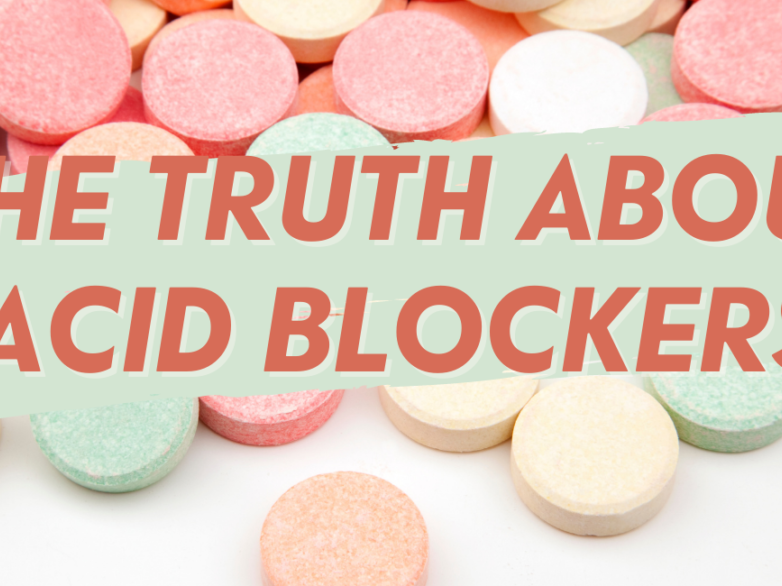
The Truth About Acid Blockers
Many people who struggle with acid reflux and heartburn are very dependent on antacids or acid blockers because they mistakenly believe that they only have two options:
1. Deal with the issues for the rest of their lives or
2. Rely on antacids or acid-blockers indefinitely.
But taking these “indefinitely” or for a long-term period will make things worse! Have you ever read the fine print on the label which says “do not use for more than two weeks”?
I’m guessing you didn’t!
Acid blockers are not actually fixing the cause of heartburn or acid reflux in the first place. They’re just a “band-aid” approach.
In other words, they’re just masking the symptoms. So apart from them being extremely dangerous in the long term, they are not actually fixing the issue.
TOO MUCH OR TOO LITTLE STOMACH ACID?
This is where all the confusion starts… you are given the antacids because of the symptoms of “too much stomach acid” but in reality, the problem is usually low stomach acid!
When the food enters your mouth, it is exposed to salivary enzymes and these are responsible for breaking down foods. Once swallowed, it goes to the stomach after it moves down the esophagus.
But before reaching it, the food needs to pass through the bottom part of the esophagus called the “lower esophageal sphincter ‘s(LES)’. Imagine it as the door to your stomach and once food enters that door, nothing should be allowed to come out.
If there is not enough stomach acid, the LES will not close and the little bit of acid (or food) you have in the stomach will come up the esophagus and cause acid reflux.
You’re then prescribed an acid-blocker to “help” with your symptoms but now it’s lowering your stomach acid even further!
WHAT LOWERS STOMACH ACID?
Chronic stress and being stuck in the sympathetic nervous system state (aka “fight or flight”) will inhibit the production of stomach acid.
Not eating the right foods and having compromised gut health can also contribute to low stomach acid.
THE DANGERS OF ANTACIDS
1. It lowers stomach acid
Remember, stomach acid is responsible for breaking down the foods that you eat! If you don’t have enough of it, it will be harder to break down foods and this will cause a host of digestive issues.
2. Linked to cancer
Proton Pump Inhibitors (PPIs) are commonly prescribed if you have symptoms of acid reflux. The problem is that they block the stomach acid but do not block the enzymes and other things from going back up to the esophagus.
There are multiple studies that show that many people get esophageal cancer from acid blockers and that is because it allows for other types of acids and enzymes to come up into the esophagus and these begin to eat away the lining of the esophagus.
3. Increases risk of bacterial overgrowth
PPIs prevent you from digesting foods and proteins properly. This means that the food will begin to ferment in your gut which can then lead to small intestinal bacterial overgrowth, poor mood, excess weight gain, and inflammation.
4. Decreases absorption of Nutrients
You won’t be able to break down foods as well if you have low stomach acid and this will hinder your ability to absorb nutrients such as B12, folic acid, zinc, calcium, & iron.
BOTTOM LINE
These antacids can give you short-term relief but they won’t solve your health issues permanently. In fact, they are probably the cause of why your symptoms are worsening.
I’m glad to say that I’ve been able to help hundreds of people in my private practice with acid reflux naturally. This is because we look at the root cause rather than the symptoms alone.
Addressing an imbalanced gut is an essential part of the journey. My GI Protocol is hands-down some of the best protocols out there.
It is based on the exact science of how our digestive system works because we need to repopulate with acidic-based bacteria that will wipe out what shouldn’t be there in the first place. Only after we put place holders do we start to repopulate again…

Follow Our Instagram For Exclusive Content





 د.إ / AED
د.إ / AED



Leave a comment